Polluted development: Profits for few, losses for all

Environmental awareness is often depicted as a luxury only suitable for the elite or celebrities who can go a long way to protect a few pandas or blue whales. But from the perspective of public interest, it is not a leisurely hobby. As Ramachandra Guha argued in his book Environmentalism: A Global History, the masses' environmentalism – especially that of marginalised people – is a part of their lives, livelihoods, and culture. When the inhabitants of the Himalayan region in India formed the "Chipko" or tree-hugging movement to protect the forests of Uttar Pradesh, or when men, women and children formed human barricades known as "empates" to prevent bulldozers from tearing down trees in the Amazon, or when people rose up in Bangladesh's Phulbari to protect water bodies and agricultural land in the area, they were all part of the same struggle to protect life-livelihood-culture.
Bangladesh's ongoing development model is insensitive towards the importance of a healthy environment in the livelihoods and culture of people. And it is mainly built on low wages and high environmental pollution. Just as labour, the environment, too, seems cheap in our country. Here, labour and environment can be exploited for the sake of profits, the consequence of which is severe pollution and damage to people's lives and livelihoods. Under this development model, some groups may benefit financially in the short term, but in the long term, it appears as a big obstacle in the path of growth and development for all.
The Shitalakkhya, Turag, and Balu rivers around Dhaka city are dying due to the pollution caused by untreated industrial waste that is dumped into these rivers by the numerous factories located on their banks. Present data tells us how tens of thousands of cubic metres of untreated liquid industrial waste are dumped in the Buriganga River alone every day. Given that treating one cubic metre of liquid waste costs around Tk 30, the factories choose to not treat this waste and instead find it easier dump it into our life-giving rivers year after year.
This practice may earn factory owners some short-term financial gains, but for everyone else, the loss is devastating in the long term. Fish production decreases in these rivers' polluted water, which affects the livelihoods of fishermen. Soil is contaminated due to water pollution, leading to reduced crop production in the dry seasons. The groundwater table also gets polluted, which contaminates our food production and water. Gazipur can be cited as an example of this kind of polluted development: over the past decade, many industries have been set up in Gazipur destroying a large amount of forests and wetlands. Only 556 out of 2,220 factories in the industrial district of Gazipur have effluent treatment plants. Of these, fewer than one percent use or maintain treatment plants.
To understand the consequences of such cost-saving practices and who has to pay for it, one can look at the pollution of Belai Beel, spanning a 40 sq-km area across Gazipur Sadar, Kapasia, Kaliganj, and Sreepur upazilas. Liquid effluents from factories in these areas are polluting the water of Turag, Chilai and Balu rivers, and through the canals polluting the Belai Beel. Whereas during the 90s, the average yield of paddy per bigha in the area was 24-25 maunds, due to pollution, the average yield of paddy per bigha has reduced to only 13-14 maunds. Even five to six years ago, a group of fishermen used to catch 35-40 kg of fish every night, but due to pollution, it has come down to only 7-8 kg. Because of this, many fishermen have been forced to leave their profession and become day labourers. Thus, the present and future of millions of people are being damaged because of the pollution of our rivers, canals and rivers, which is happening for the profit maximisation of only a few hundred factory owners.
Let's take a look at the state of air pollution. According to the World Air Quality Report of Switzerland-based organisation IQAir, Bangladesh's air quality remained the worst in the world for four years in a row. The average annual airborne particles, referred to in the report as PM2.5, was 76.9 micrograms per cubic metre in Bangladesh, which was 15 times the limit set by the World Health Organization (WHO). With an annual average PM2.5 concentration of 78.1 micrograms per cubic metre, Dhaka ranked the second most polluted capital in the world, only behind New Delhi.
A model of economic development that only emphasises financial growth while neglecting the environmental aspect works in the interests of a few, while harming most people. It is, therefore, important to reject this type of environmentally destructive economic development model.
The main sources of air pollution are emissions from unfit vehicles, fumes from factories and brick kilns, and dust from construction activities. Although thousands of vehicle and factory owners or contractors benefit financially by driving unfit vehicles, operating factories and brick kilns without emission control, and carrying out construction work and transporting and storing construction materials without proper dust control measures, people across the country are suffering physically, mentally, and financially because of different diseases catalysed by air pollution.
Instead of mitigating this crisis, the government is taking steps to legitimise air pollution. According a report published in The Daily Star, the Department of Environment (DoE) recently allowed 400 mg of sulphur dioxide and nitrogen oxides and 100 mg of particulate matter per cubic metre for coal-fired plants launched before 2020, and allowed 200 mg of sulphur dioxide and nitrogen oxides and 50 mg of particulate matter per cubic metre for those launched after 2020. In comparison, the emission standards set in Japan and China, who have invested in coal-fired plants in Cox's Bazar and Chattogram, are far more stringent: Japan's standards for PM2.5, sulphur dioxide and nitrogen oxides per cubic metre are just 5 mg, 28 mg and 40 mg, respectively. In China, the limits are 10 mg, 35 mg, and 50 mg, respectively.
It is the general people who have to pay for the government's negligence in controlling air pollution for the benefit of local and foreign investors. Due to air pollution, people suffer from cardiovascular and respiratory diseases, asthma, bronchitis, pneumonia, lung cancer, strokes and heart attacks at a higher rate. According to a 2022 World Bank study, for each percent increase in PM2.5 levels above the WHO-recommended level, an individual's risk of developing shortness of breath increases by 12.8 percent, coughing by 12.5 percent, and respiratory tract infection by 8.1 percent. As the PM2.5 concentration in our air far exceeds the WHO-recommended level, a large number of people are suffering from these diseases, resulting in an average of 78,000-88,000 people dying prematurely every year.
Due to air pollution, people are suffering from mental illness too. Air pollutants enter the body through inhalation and eventually damage the nervous system, which in the long run can cause depression and anxiety. A one percent increase in PM2.5 concentration above the WHO-recommended level increases a person's risk of developing depression by 20 percent. In addition, according to the report, the amount of financial loss due to air pollution is 3.9-4.4 percent of our GDP.
Therefore, raising voices against environmental pollution is not an elitist stunt; rather, staying silent against environmental pollution is serving the interests of the elite who are making profits from pollution. A model of economic development that only emphasises financial growth while neglecting the environmental aspect works in the interests of a few, while harming most people. It is, therefore, important to reject this type of environmentally destructive economic development model.
Kallol Mustafa is an engineer and writer who focuses on power, energy, environment and development economics.

 For all latest news, follow The Daily Star's Google News channel.
For all latest news, follow The Daily Star's Google News channel. 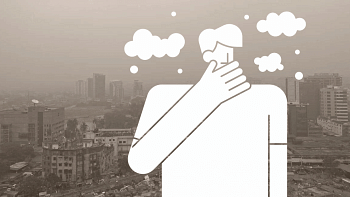

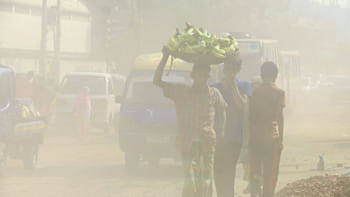


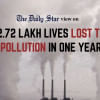

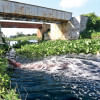



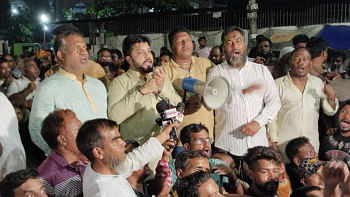
Comments